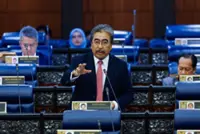BANGKOK, March 7 (Bernama): Asean’s ‘consensus dilemma’, and the need to explore new avenues in working with Myanmar’s junta to resolve outstanding issues as highlighted by Malaysian Prime Minister Datuk Seri Anwar Ibrahim recently, is a wake-up call for Asean to reconsider its approaches to help end the crisis in the troubled member state.
Anwar, at a talk at the University of the Philippines on Thursday during his two-day visit to the Philippines, said while decision-making by consensus continues to be a central tenet of Asean, this does not mean that it should remain silent over developments in member states that affect the wider region, or particularly egregious violations of the Asean Charter by its own members.
Already a subscriber? Log in
Save 30% OFF The Star Digital Access
Cancel anytime. Ad-free. Unlimited access with perks.





